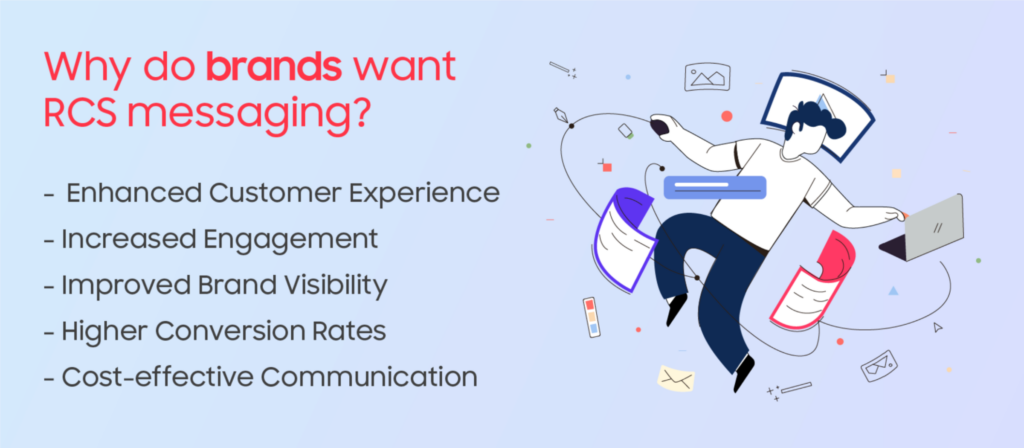Rich Communication Services (RCS) is back in India, and every brand is scrambling to leverage this new tech to elevate their CX. RCS offers businesses a more interactive and engaging way to reach customers in their SMS inbox, making it a highly sought-after space for brands to capture. With so much at stake, aggregators, ISVs, and developers that help brands and businesses offer a seamless RCS experience will be top gainers, adding to their returns and complementing their SMS revenues.
In this blog post, we will discuss the benefits of RCS adoption for aggregators, ISVs, and developers and provide tips for effective implementation.
Why do brands want RCS messaging
- Enhanced Customer Experience: RCS messages provide customers with a more interactive and engaging experience than traditional SMS messages. With RCS, ISVs can send rich media messages that include images, videos, and interactive buttons. This can help businesses provide customers with a more personalized and engaging experience, leading to increased customer satisfaction.
- Increased Engagement: RCS messages are more engaging than traditional SMS messages. They offer features like read receipts, typing indicators, and location-based messaging. These features encourage customers to engage with messages and respond more frequently. This increased engagement can help businesses build stronger customer relationships and drive more conversions.
- Improved Brand Visibility: RCS messages allow businesses to use their brand colors, logos, and other brand assets, helping to increase brand visibility. This can help businesses differentiate themselves from competitors and increase brand recognition.
- Higher Conversion Rates: RCS messages have been shown to have higher conversion rates than traditional SMS messages. This is due to their interactive and engaging nature, which encourages customers to take action.
- Cost-effective Communication: RCS messages are cheaper than traditional SMS messages, making them a cost-effective way for businesses to communicate with customers.

The Current RCS Messaging Landscape Globally
The current RCS messaging landscape globally is one of rapid growth and adoption, particularly in regions such as Europe and Asia. RCS is seen as a key technology for the future of messaging, offering a rich and interactive messaging experience that combines the best of traditional SMS messaging with new multimedia features.
In Europe, the adoption of RCS messaging has been particularly strong, with many mobile network operators offering RCS messaging services to their customers. For instance, UK, France, Italy, Sweden, Belgium, Greece, Spain, and Germany, have seen significant adoption of RCS messaging.
In Asia, countries such as South Korea and Japan have been at the forefront of RCS adoption, with many mobile network operators offering RCS messaging services to their customers. In South Korea, for example, SK Telecom launched its own RCS messaging service in 2012 and has since seen strong adoption among its customers. In Japan, RCS messaging has been widely adopted by both consumers and businesses, with many major brands and enterprises using RCS to engage with customers. RCS is back in India, with Vodafone-India, Airtel, and Jio now supporting RCS and multiple prominent brands already running successful RCS campaigns.
Some other notable countries include, Canada, South Africa, Nigeria, DRC, Argentina, Brazil, Mexico, and Chile. Overall, with over 800 MM users globally, the RCS messaging landscape is one of growth and innovation, with many businesses and mobile network operators adopting this technology to improve customer communication and engagement. As the technology continues to develop and become more widely adopted, the potential for RCS messaging to transform the way businesses interact with their customers is significant.
Challenges of RCS Adoption
While RCS messaging offers many benefits, there are also several challenges that aggregators, ISVs, and developers face when adopting this technology. Here are some of the key challenges:
- Fragmentation: RCS messaging is still not universally supported by all carriers and devices, which creates fragmentation and makes it difficult to achieve broad adoption. As a result, businesses may need to develop multiple versions of their messaging campaigns to ensure compatibility across different platforms.
- Compliance: As with any form of messaging, RCS messaging is subject to various regulations and compliance requirements, such as data privacy laws, TCPA guidelines, and carrier-specific rules. Aggregators, ISVs, and developers must ensure that their messaging campaigns comply with all relevant regulations and guidelines, which can be time-consuming and complex.
- User Education: RCS messaging is a relatively new technology, and many users may not be familiar with its features and capabilities. As a result, businesses must invest in user education and awareness campaigns to help customers understand the benefits of RCS messaging and how to use it effectively.
- Integration: Integrating RCS messaging with existing business systems and processes can be a challenge, particularly for larger enterprises with complex IT environments. Aggregators, ISVs, and developers must ensure that RCS messaging is integrated seamlessly with existing systems and processes to avoid disruption and maximize efficiency.
- Competition from Other Messaging Apps: While messaging apps like WhatsApp and Facebook Messenger are popular, they do not support RCS. This means that you may need to compete with other messaging apps for customer attention, making it challenging to gain traction for RCS.
These challenges highlight the importance of careful planning and execution when adopting RCS messaging. While RCS messaging offers many benefits, businesses must carefully consider the costs and complexities involved and develop a clear strategy for adopting and integrating this technology into their operations.
Future Outlook for RCS
The future outlook for RCS messaging is bright, with many experts predicting continued growth and adoption of this technology in the coming years. Here are some of the key trends and predictions for RCS messaging globally:
- Increased Adoption: As more carriers and devices support RCS messaging, adoption is expected to increase significantly. In fact, some experts predict that RCS messaging will eventually replace SMS messaging as the primary messaging platform for businesses and consumers.
- Integration with AI: RCS messaging can be integrated with artificial intelligence (AI) technologies, such as chatbots and virtual assistants, to create more personalized and interactive messaging experiences for customers.
- Expansion into New Industries: While RCS messaging has already been adopted in industries such as retail, travel, and hospitality, there is potential for growth in other industries, such as healthcare, finance, and education.
- Greater Focus on Privacy and Security: With increasing concerns about data privacy and security, there is a growing focus on ensuring that RCS messaging is secure and complies with relevant regulations and guidelines.
- Integration with Payment Systems: As businesses look for ways to streamline their payment processes, there is potential for RCS messaging to be integrated with payment systems, allowing customers to make payments directly through the RCS message window.
Overall, the future outlook for RCS messaging is promising, with continued growth and adoption expected in the coming years. As businesses continue to adopt and integrate this technology into their operations, it is likely that we will see new and innovative use cases emerge, creating even more opportunities for businesses to engage with customers through messaging.
Challenges Aggregators, Developers, and ISVs face in implementing RCS
Implementing RCS can be a complex process, but the right partner can ensure a smooth, hassle-free, and a successful implementation:
Technical Requirements and Integration: Ensure your systems are compatible with RCS to integrate it seamlessly with existing communication channels.
Ensuring Compliance with Regulations: Ensure your RCS implementation complies with local regulations, including data protection and privacy laws.
Choosing an RCS solution like the RBM Hub® can help you easily overcome these challenges and deploy RCS globally. With the RBM Hub®, you can offer interconnectivity with all and any RCS platforms all over the globe. With a single agreement, you can deliver RCS messages to all carriers in compliance with all national and local regulations regarding data protection and privacy.
As the RCS user base continues to grow, there are significant opportunities for ISVs, aggregators, and developers to provide services and solutions that help businesses integrate and use RCS effectively. By staying ahead of the curve and partnering with industry-leaders in RCS like Dotgo, ISVs, aggregators, and developers can position themselves as leaders in this growing market and provide value to their customers.





